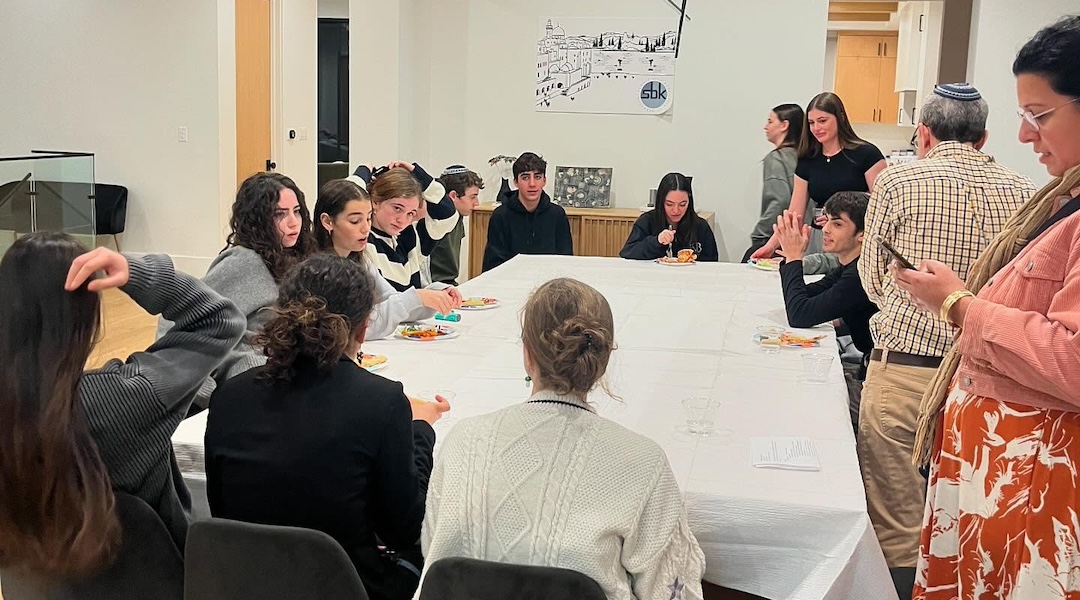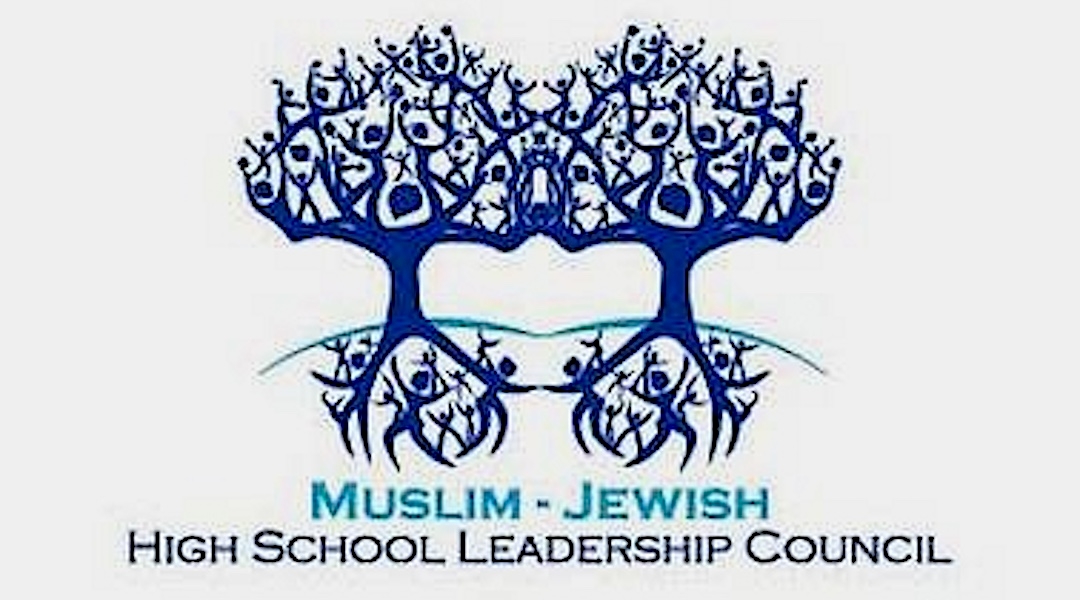This article was produced as part of JTA’s Teen Journalism Fellowship, a program that works with Jewish teens around the world to report on issues that affect their lives.
Micah MikoLevine felt isolated and invisible on her private high school campus in Pasadena, California after the Oct. 7 terrorist attack in Israel.
“There was this feeling within our affinity [group] that people didn’t feel like they could talk about anything,” said MikoLevine, 18, who is a Conservative Jew. “You would go to school and you’d have to put a mask on of normalcy, despite the world not being very normal.”
Instead of people engaging in face to face conversations, MikoLevine noticed most discussions among her peers were occurring on social media, preventing any true back-and-forth discourse from taking place. Hoping to engage in meaningful, productive interfaith conversations, MikoLevine joined the 2024-2025 cohort of the Muslims and Jews Inspiring Change Council, or MAJIC.
With antisemitism and Islamophobia spiking since the Oct. 7 attacks and the start of the war in Gaza, the MAJIC Council aims to provide a path forward for the two communities through dialogue and understanding.
The council is located in Los Angeles, where hate crimes against Jewish and Muslim people reached an all-time high in 2023. Tensions surrounding the Israel-Hamas war have led to antisemitism on high school campuses as well on college campuses such as the University of California, Los Angeles. In April 2024 pro-Israel activists attacked the pro-Palestinian encampment at UCLA, leading to numerous physical altercations.
Ryaan Khuwaja, who is a Pakistani Muslim, found MAJIC while searching for an opportunity to partake in more balanced dialogue about the Israel-Palestine conflict.
“Growing up with all Jewish friends, you didn’t really know when it came down to the events of Oct. 7 who was right, who was wrong because you only heard one side of the story, which was, ‘the Israelis died,’ and all my friends are Zionist,” said Khuwaja, 17, who joined the council in August. “I didn’t know how to voice my opinions on what was going on, not just because I didn’t have certain specific, correct facts on what was going on, but also because I didn’t know how to voice my opinion to people who differed from me.”
Led by the organization NewGround: A Muslim-Jewish Partnership for Change, the MAJIC Council builds partnerships between Jewish and Muslim teenagers in Los Angeles through dialogue and community service projects. The current MAJIC Council consists of 10 Muslim and 10 Jewish students. Each cohort serves a yearlong term.
“I learned a lot more about what Jewish ideals and traditions they hold closer to themselves: spending time with families on Fridays, being together as a community on Shabbat or even at temple. I didn’t know a lot of Jewish people didn’t believe in the afterlife,” Khuwaja said, citing one of the range of Jewish opinions on the subject. “They don’t do things right now for the afterlife because they don’t believe in the afterlife. Meanwhile, Muslims do everything in their life just so they could have the possibility of having a good afterlife.”
When the MAJIC Council was founded in 2013, it had a general mission of connecting Jewish and Muslim teenagers. Since Oct. 7, however, the council shifted to focus on the Israel-Hamas war.
“I don’t think the Muslim or the Jewish community owns the truth,” said Rabbi Michelle Missaghieh of Temple Israel of Hollywood, who serves on the MAJIC Council advisory board. “The only way for us to reach and envision a way of peace and a way of working together is hearing each other’s stories, and that’s what the MAJIC program tries to teach this next generation how to do.”
Through a series of facilitated conversations, the group built trust with each other by focusing on individual perspectives and religious identity. Discussions about the war in Gaza and Israeli policy are approached through a framework of “conflict literacy,” where students expect to disagree while also seeking to ask questions that will lead to some connection or middle ground.
At first, discussing the current conflict posed a challenge for the students.
“Post-Oct. 7, the teens had to really grapple with how to continue to be in dialogue when both sides were really in deep, deep pain,” Missaghieh said.

MAJIC graduates spoke with students from B’nai David-Judea Congregation in Los Angeles about the conversations they had in the aftermath of Oct. 7 and the war in Gaza, March 3, 2025. (Courtesy NewGround: A Muslim-Jewish Partnership for Change)
“We looked at experiences people in Gaza felt, such as a lady who was living in the Gaza Strip,” Khuwaja said. “She was persecuted a lot. She had the Israeli police coming to her house every week and often following up with her, harassing her at times. A lot of the Muslim cohort was sympathetic to her. They didn’t feel like they had any justification to do so to her. But then, a lot of the Jewish cohort believed Israel wouldn’t have [singled her out] without a proper argument for it.”
The students have found a way forward.
“We like to say that what we say sometimes is first drafts,” MikoLevine said. “I might not have all the words together, but through that process and hearing other people’s first drafts, I’m collecting an idea of what I want to believe or what I want to see, getting a better understanding of it all.”
The council members comprise a range of ideological beliefs, with some identifying as pro-Israel or pro-Palestine while others fall in between. For Khuwaja, learning about other people’s backgrounds is key to understanding their beliefs.
“I know one of my peers, his own mom lives in Israel right now, so that’s why he feels more obligated towards defending Israel whenever he can because it’s his family there,” Khuwaja said. “I completely understand that; I would feel that way too. So it’s just overcoming those previous biases in order to grow and understand, ‘What is the factual thing that we’re looking at?’”
Beyond ideological differences, some of the group’s conflicts have instead stemmed from misunderstandings.
“There’s been moments where someone has shared something and another has jumped to thinking they meant something that they didn’t,” MikoLevine said. She hesitated to give an example without permission from others involved in the conversation.
During the practice of being reflective instead of reactive, council members have made a significant discovery: They have more in common than they initially thought.
Even when the teens fundamentally disagree on key issues, they managed to find common ground through their commitment to listening to one another and a focus on understanding instead of seeking consensus.
“The goal isn’t for everyone to walk out agreeing,” said Maya Al-Mansour Mathews, an alumna of the 2019-2020 MAJIC cohort who now serves as alumni coordinator. “The goal is for everyone to walk away feeling like, ‘Someone understood my point of view. They might not agree with it, but they understand why I’m there.’”
“They [the students] were able to really hear one another and sit with one another’s pains and truths,” Missaghieh said.
This year, in order to help students navigate difficult conversations, adult facilitators Shachar Cohen-Hodos and Tasneem Noor created intrafaith spaces for Muslim and Jewish students to break out into separate groups before coming back together as a full cohort.
“By creating the intrafaith spaces, we were able to help the students be able to speak their fears or their concerns out loud and then workshop,” Noor said.
Noor recounted a discussion halfway through the second meeting focused on the Israeli-Hamas war when some students in the Muslim intrafaith group were struggling to navigate how to discussƒmathe the war with their Jewish peers.
“The thing that was really important was just acknowledging that every life has value, and they didn’t want ‘it’s just war and war is ugly’ to take away from the real cost of the war. They wanted to say that innocent Palestinian civilians are being killed and are paying the cost. They wanted to speak to the humanity of the Palestinian civilians,” said Noor.
After Noor worked with the students to practice articulating what they wanted to say, the two groups came back together, and the students shared their perspectives.
“They were really proud that they said what they wanted to say, and they stayed patient and curious and resisted going into a debate,” Noor said.
Al-Mansour Mathews said that her experience with MAJIC affects her actions and beliefs beyond the council.
“It really does help to know how to understand other people and talk to other people,” Al-Mansour Mathews said. “It’s important that we see one another and that we talk to one another and try to understand and be understood.”

Led by the organization NewGround: A Muslim-Jewish Partnership for Change, the MAJIC Council builds partnerships between Jewish and Muslim teenagers in Los Angeles through dialogue and community service projects. (Courtesy)
“My favorite moment from the council was when we went to our Pali retreat,” Khuwaja said, referring to an overnight MAJIC program held at a conference center east of Los Angeles. “It was our first night. After dinner, we were all hanging out in the quad, and it was just a night for us to get to know each other. We were playing pickleball, playing football, talking, getting to know each other, figuring out that we had so many mutual connections. That moment sat with me, and I think about it a lot because we just got to be kids and understand that no matter what we say or where we come from or what we think, we’re still all human, and we have to be there for one another no matter what—because who else will be?”
Now, Khuwaja is working on bringing the knowledge he has gained to conversations outside of the MAJIC Council.
“I’m more informed whenever I walk into a discussion on any topic regarding the Israel-Palestine conflict,” Khuwaja said. “I go to a school that’s mainly Jewish; my entire neighborhood is Jewish. Now I know how to voice my own perspective while not putting down theirs, but also while giving my opinion on what I believe is factual.”
Al-Mansour Mathews hopes that more people will begin to have interfaith discussions as the MAJIC Council has done.
“This [work] is applicable in conflict resolution in general,” said Al-Mansour Mathews. “This is how we can become more critical thinkers. This is how we can really understand complexity and nuance, and I think these kinds of conversations and these dialogues would help classrooms have stronger and more interesting intellectual debates or musings. I think that this would create stronger communities because conflict is also an opportunity to dive deeper into relationships and allow individuals to be their most authentic selves.”
“The work that we do is the work of the future. It’s the work of hope,” MikoLevine said. “During each session, we’re creating hope, and I hope there’s more hope to be made in more places.”
JTA has documented Jewish history in real-time for over a century. Keep our journalism strong by joining us in supporting independent, award-winning reporting.






